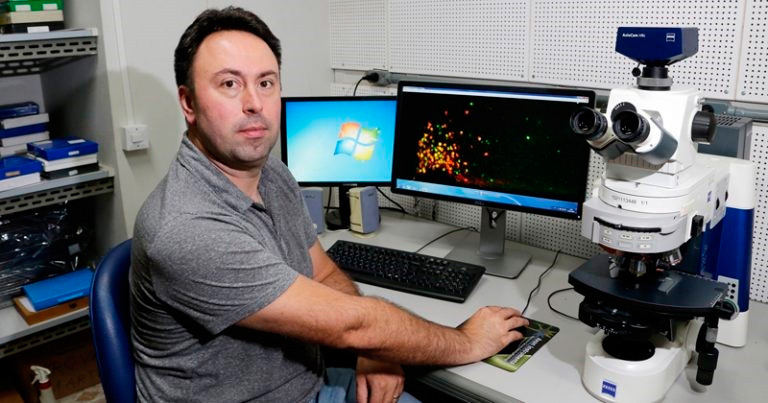Discovery of the Institute of Biomedical Sciences sets a precedent for studies on new treatments for obesity

Growth hormone (GH) is produced by the pituitary gland and is responsible for regulating height and bone growth. However, a discovery by USP’s Institute of Biomedical Sciences (ICB) may not only make this hormone to have its name altered, but also require updating of physiology didactic textbooks. It is due to the fact that scientists have found GH as also responsible for activating a group of hypothalamic neurons called AgRP, which control food intake and energy expenditure.
In the experiments with mice, because of food deprivation, the control group animals’ organisms underwent a series of metabolic and endocrine alterations to save energy. Animals without GH receptors in AgRP neurons did not enter this “economic mode” and thus have lost more weight and body fat.
These findings set a precedent for GH blockade to be therapeutically useful in treating obesity. “In the long term, our findings may stimulate further research into the development of compounds or drugs aimed to optimize weight loss,” it was explained by Professor José Donato Júnior, from the Department of Physiology and Biophysics, one of the authors of the study.
The data are described in the paper Growth hormone regulates neuroendocrine responses to weight loss via AgRP neurons, published in early February on the multidisciplinary science journal Nature Communications, and whose first author is the researcher Isadora C. Furigo.
“We have found that over 90% AgRP neurons express GH receptors,” Donato Junior stated. Feeling hungry is a sensation that comes from signals emitted by the brain, which knows that the person has not eaten because of a signal that was sent to it by some hormone: GH is that signal.
GH is like a siren that the body activates and is heard by AgRP neurons, since they have receptors for this hormone. And GH, acting on these neurons, coordinates all bodily adaptations aimed at energy saving.”
The Professor explained that a paper published in the 1960s on Science Magazine had already shown that GH is highly secreted when we are in food deprivation. To act on body growth, GH secretion must have a pulsatile pattern, that is, it has to be secreted in pulses over time. With food deprivation, GH is secreted continuously, but this new pattern prevents the hormone from acting to stimulate growth. But, then, why does the body produce GH during food deprivation?

This was a question that scientists could not explain so far. The study has provided answers to this questioning: ICB’s researchers have found that GH, by activating AgRP neurons during food deprivation, stimulates the “economic mode” of the organism by decreasing both the thyroid hormone secretion and the metabolism. “That’s why it’s so difficult to lose weight: the body adapts to the situation,” Donato Júnior said.
Economic mode
The researchers have created mice without GH receptor for these neurons. When these animals underwent food deprivation, T4 hormone fell slightly, but this decrease was much more pronounced in the control group.
In the case of testosterone, which helps produce muscles and give strength, the mice without GH receptor did not have this hormone decreased, unlike the other group. In turn, the control group animals, during food deprivation, underwent metabolic and endocrine changes to save energy and enter the “economic mode.”
It is the action of GH on AgRP neurons that coordinates these adaptations. The mice without GH receptor in these neurons lost weight because they did not conserve energy during food deprivation.
Matter of survival
Another group’s finding was regarding leptin, secreted by white adipose tissue. The levels of this protein in the control group animals decreased with food deprivation. But the levels of the protein stopped lowering in animals without GH receptor.
“Leptin is a very important hormone to regulate hunger and energy expenditure, and we have found that GH plays a similar role. The increase in GH and the decrease in leptin levels are signs that reach the hypothalamus, transmitting that the body is in food deprivation and should save energy to ensure survival,” the Professor explained. In other words, if one mechanism fails, the other assumes the task. Previous studies have shown that when the body begins to lose fat, the level of leptin decreases, and this decrease is a signal that is also transmitted to the AgRP neuron.

According to the Professor, the person may have numerous strategies to lose weight, but from the moment the organism realizes that it is losing weight, it will adapt. This is because it is more interested in preserving the survival of the body than eliminating the excess pounds. The organism always sees weight loss as negative, even if that weight loss would bring benefits.
“In nature, it is very rare to find an obese animal. Maybe that’s why, somehow, during evolution, the body simply started considering only weight loss. When it detects this, it turns on the alert for the body to adapt and save energy. And that alert is exactly the role of GH,” he declared.
More information: e-mail jdonato@icb.usp.br, with Professor José Donato Júnior
Valéria Dias – Jornal da USP
